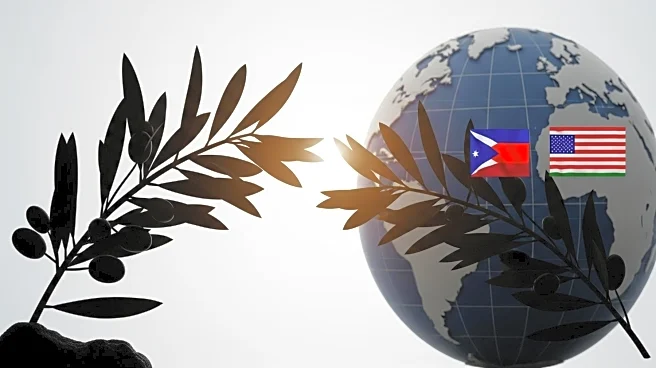What's Happening?
A US delegation led by envoy Steve Witkoff is set to participate in peace talks in Egypt aimed at ending the conflict between Hamas and Israel. The talks, taking place in Sharm el-Sheikh, coincide with the second anniversary of the Hamas attack on Israel that initiated the ongoing war. President Trump has proposed a 20-point plan to end the conflict, which has been accepted in principle by both Israel and Hamas, though both parties have reservations and seek changes. The discussions focus on establishing a ceasefire, releasing hostages, and delivering humanitarian aid to Gaza. The plan has received international support, but significant challenges remain, including the disarmament of Hamas and the future governance of Gaza.
Why It's Important?
The involvement of the US delegation in the Gaza peace talks underscores the international effort to resolve the conflict and address the humanitarian crisis in the region. The talks are crucial for establishing a ceasefire and ensuring the delivery of aid to the affected population. The success of the negotiations could lead to a significant reduction in hostilities and pave the way for long-term peace and stability. However, the complexity of the issues at hand, including the disarmament of Hamas and the governance of Gaza, presents significant obstacles. The outcome of the talks will have implications for regional security and international relations.
What's Next?
The peace talks are expected to continue for a few days, with both sides urged to reach a consensus quickly. The US delegation, including Jared Kushner, will keep President Trump informed of developments. The plan envisions an international security force in Gaza and the release of Palestinian prisoners by Israel. However, disagreements over the specifics of the plan, including the disarmament of Hamas, remain. The international community is closely monitoring the talks, hoping for a breakthrough that will lead to a lasting resolution of the conflict.
Beyond the Headlines
The peace talks highlight the geopolitical complexities of the Middle East conflict and the challenges of achieving a sustainable resolution. The involvement of international actors reflects the global significance of the conflict and the need for a coordinated approach to peacebuilding. The negotiations also raise questions about the role of foreign forces in Gaza and the future governance of the territory. The success of the talks could set a precedent for resolving other conflicts in the region.











